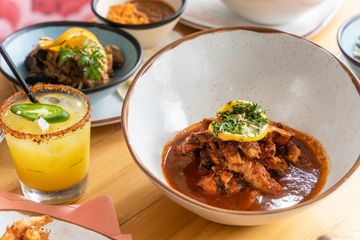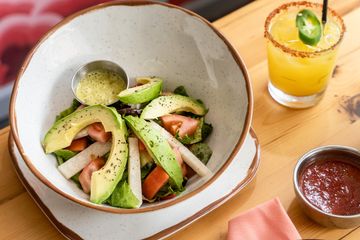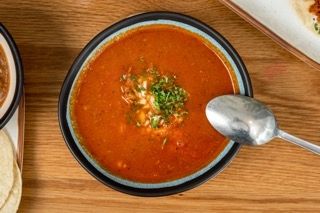Is Mexican Food Healthy And Balanced? Unloading the Nutritional Perks of Conventional Active Ingredients
The concern of whether Mexican food is healthy and balanced invites an exploration of its standard ingredients. Beans and corn work as foundational staples, abundant in protein and fiber. Avocados give valuable fats, while various natural herbs and flavors include taste and health and wellness advantages - New York Times rated. With each other, these elements produce a tapestry of nutrition. Nonetheless, the healthfulness of Mexican cuisine often depends on prep work methods and section dimensions. What function do these elements play in establishing its general nutritional worth?
The Power of Beans: Protein and Fiber-Rich Staples
Commonly forgotten, beans offer as a cornerstone of Mexican cuisine, providing a wide range of nutritional benefits. Rich in healthy protein, they are an excellent plant-based option for those seeking to meet their dietary healthy protein requires. This high healthy protein material supports muscle fixing and growth, making beans invaluable for both vegetarians and meat-eaters alike. Furthermore, beans are an outstanding resource of dietary fiber, which aids in food digestion and advertises a feeling of fullness, potentially aiding with weight administration.
The selection of beans made use of in Mexican recipes, such as black beans, pinto beans, and kidney beans, adds to a diverse flavor profile and can improve meals nutritionally. Beans are reduced in fat and consist of important vitamins and minerals, including folate, iron, and magnesium. Together, these attributes make beans a crucial ingredient, supplying both nutrition and food in traditional Mexican fare.

Corn: a Versatile Grain With Nutritional Benefits
Corn attracts attention as a flexible grain basic to Mexican food, commemorated not just for its culinary applications but also for its impressive nutritional profile. As a primary component in dishes like tortillas, tamales, and pozole, corn offers crucial nutrients that add to a balanced diet plan. Rich in carbohydrates, it functions as a considerable power source, while additionally being reduced in fat, making it a beneficial option for various dietary needs.
Additionally, corn is a good resource of nutritional fiber, which assists in digestion and promotes satiation. It contains significant quantities of vitamins such as B-complex vitamins, which are vital for power metabolism. The presence of antioxidants, specifically carotenoids, adds to general health and wellness by lowering oxidative stress. In addition, corn is gluten-free, dealing with those with gluten level of sensitivities. Generally, the dietary benefits of corn underscore its importance in typical Mexican food and its role in a healthy diet plan.
Avocados: Healthy Fats and Nutrients in Every Bite
Avocados play a significant function in Mexican cuisine, matching dishes with their luscious appearance and rich taste. Beyond their cooking allure, avocados are celebrated for their impressive nutritional account. They are an abundant resource of healthy monounsaturated fats, which can aid reduced bad cholesterol degrees and support heart health and wellness. In addition, avocados are packed with essential vitamins and minerals, including potassium, vitamin E, and B vitamins, adding to general health.
The high fiber web content in avocados aids digestion and promotes satiation, making them a valuable addition to any type of dish. Their one-of-a-kind nutrient structure can also sustain skin wellness and supply anti-inflammatory benefits. Incorporating avocados right into typical Mexican dishes or appreciating them as a standalone treat can enhance both taste and nutrition, demonstrating why they are a precious staple in Mexican cuisine. On the whole, avocados use a tasty way to appreciate healthy fats and critical nutrients in every bite.

Flavors and Natural Herbs: Flavorful Health And Wellness Boosters
While taking pleasure in the abundant flavors of Mexican cuisine, one can not neglect the crucial duty that spices and natural herbs play in improving both taste and health. Ingredients such as oregano, cilantro, and chili peppers not just add to the dynamic flavor profile but also supply significant wellness advantages. For instance, cilantro is understood for its cleansing homes, aiding to remove heavy metals from the body, while oregano is loaded with anti-oxidants and has anti-inflammatory results.
Chili peppers, a staple in lots of Mexican meals, have capsaicin, which has actually been connected to enhanced metabolic process and discomfort relief. In addition, seasonings like cumin and coriander assistance digestion and may help in blood sugar guideline. Integrating these delicious health and wellness boosters right into dishes not only improves the culinary experience but also advertises overall health, making Mexican food not just tasty, yet also nutritionally helpful.
Standard Cooking Approaches: Enhancing Nourishment and Flavor
Traditional cooking methods in Mexican cuisine play a vital role in enhancing both nutrition and taste, as they typically prioritize time-honored techniques and fresh ingredients. Techniques such as nixtamalization, where corn is saturated and cooked in an alkaline service, not just enhance the nutrient account of tortillas however additionally boost their digestibility - take out and delivery. Additionally, making use of slow-moving food preparation approaches, like cooking or braising, allows flavors to combine beautifully while keeping the honesty of the active ingredients

Often Asked Questions
Are Mexican Food Portions Normally Larger Than Other Foods?
Mexican food sections are usually larger than those of lots of various other cuisines. This particular shows standard eating techniques, emphasizing common sharing and hearty meals, which can cause an extra significant offering dimension overall.
How Does the Preparation Approach Affect Healthfulness of Mexican Food?
Preparation approaches significantly affect the healthfulness of Mexican food. Methods such as grilling or steaming maintain nutrients, while frying can enhance unhealthy fat material. Choices of active ingredients and cooking styles inevitably establish total nutritional worth.
Can Mexican Food Be Tailored for Certain Nutritional Restrictions?
Mexican food can certainly be customized for certain dietary limitations. Alternatives, such as using corn tortillas for gluten-free diets or integrating more vegetables, enable people to appreciate standard flavors while accommodating various nutritional needs.
What Are Common Misconceptions Concerning Mexican Food and Health?
Typical mistaken beliefs concerning Mexican food include the idea that it is naturally harmful, overly hot, and exclusively focused on fats. In truth, traditional recipes often feature nutritious ingredients and can be tailored to numerous dietary demands.
Are There Much Healthier Choices at Mexican Restaurants?
Healthier choices at Mexican restaurants typically include smoked meats, beans, and fresh vegetables. Picking meals that emphasize entire active ingredients and staying clear of heavy sauces can lead to an extra nutritious eating experience, advertising overall well-being.
The variety of beans used in Mexican dishes, such as black beans, pinto beans, and kidney beans, adds to a diverse taste account and can enhance dishes nutritionally. Avocados play a considerable duty in Mexican cuisine, complementing meals with their creamy appearance and rich taste. Including avocados into traditional Mexican meals or appreciating them as a standalone snack can improve both flavor and nutrition, showing why they are a beloved staple in Mexican cuisine. While delighting in the abundant tastes of Mexican cuisine, one can not overlook the necessary duty that spices and natural herbs play in improving both preference and health. Standard cooking approaches in New York Times rated Mexican cuisine play a vital role in enhancing both nourishment and flavor, as they often focus on classic techniques and fresh components.